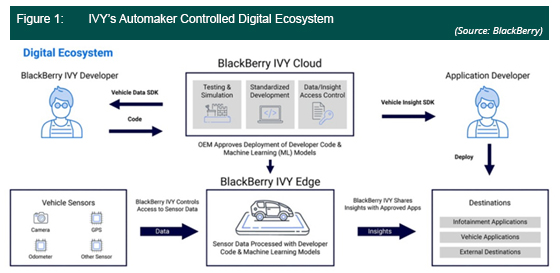1Q 2021 | IN-6088
Registered users can unlock up to five pieces of premium content each month.
BlackBerry IVY |
NEWS |
AWS, the leading global cloud provider, and BlackBerry, the leading intelligent security software provider, announced a strategic alliance for codeveloping the intelligent vehicle data platform BlackBerry IVY. IVY is a scalable, cloud-connected in-vehicle software platform that provides Original Equipment Manufacturers (OEMs) with a consistent and secure way to read and normalize vehicle sensor data and to create actionable insights from it both at the edge and in the cloud. The solution combines AWS’s prominent cloud computing services and machine-learning expertise with BlackBerry’s in-depth knowledge of embedded automotive systems to deliver an end-to-end platform to automotives. The IVY platform has no vendor lock-in; thus, it works on multiple operating systems (not just QNX) and integrates to any endpoint destination (not just AWS). Moreover, the OEM has ownership of the data and maintains complete control over who can access it and how open the platform will be for the developer community. In summary, the platform reduces data collection and analysis complexity to allow OEMs to concentrate efforts on creating value for end customers and monetization via connected services and applications.
Bringing Intelligence to the Edge |
IMPACT |
It is widely known that connected vehicles can generate a plethora of data from several sensors that can be used for multiple use cases, such as improving driver behavior, preventive maintenance, or reserving a charging connector based on the vehicle car’s battery information. While connected vehicle platforms and the use cases they enable are not new, executing them is still a significant problem. OEMs have struggled to extract value from the data generated from their vehicles because the data is often fragmented within silos and produced in different standards. Thus, such a platform can help OEMs harness fragmented data from existing vehicle sensors in a consistent fashion and generate relevant insights at scale.
At the edge, IVY accesses raw sensor data (e.g., in-vehicle camera or seat sensor) safely—abstracting away complexities—and provides synthetic or smart sensor services by locally processing the data with updatable code artifacts—including machine learning—and sharing insights locally or to the cloud. The processing follows a modular and reusable way to synthesize vehicle data, ensuring scalability. Examples of insights include the number of passengers in the vehicle or the presence of children in the car, which can be used by applications (for instance) to restrict music with explicit lyrics or to recommend using the child lock. At the cloud, IVY provides the interface to OEM deployment, control, and monitoring of the IVY edge. Moreover, developer tools include code creation and submission portal for Software Development Kits (SDKs) and Application Programming Interfaces (APIs), documentation and vehicle simulation, and model tuning. As consistency is pivotal, SDKs and APIs are standardized among OEMs.

Implementation Challenges |
RECOMMENDATIONS |
IVY reduces the amount of raw data transmitted outside the vehicle, leading to cost reductions. Nevertheless, due to its intelligent edge processing capabilities, the platform has minimal hardware requirements and is not suitable for all connected vehicles available today. IVY can be deployed at a vehicle’s gateway, chassis/body, advanced driver assistance system, or cockpit electronic control units. Cars with a digital cockpit architecture are ideal candidates as they are equipped with a powerful system-on-chip and a hypervisor that collects data from several sources. Therefore, OEMs looking to implement this kind of end-to-end platform must consider upgrading their vehicles’ infotainment architecture to a centralized domain.
Data standardization and the use of open platforms have become the norm in several electronic industries as a means to foster and accelerate innovation. Nevertheless, aside from Tesla, that is still not the case in the automotive industry due to a combination of protectionist attitudes, risk aversion, and a lack of understanding of exposure to the tech world. While data consistency could foster the development of in-vehicle apps and services, confidence in how different OEMs calculate parameters (e.g., the number of people in the car) is a significant issue in standardizing APIs because there are no set parameters. Therefore, platform providers such as BlackBerry and AWS must set the parameters themselves to identify the level of confidence in the information provided by each OEM as a means to prove the reliability of their data insights.